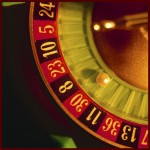Due to Hit: Gambler’s Fallacy
Posted August 3, 2009
What follows is intended to be a primer on a common error in reasoning known as Gambler’s Fallacy. It is mostly a description, but includes the simplest explanation for why humans tend to fall prey to this error.
Gambler’s or Finite-Supply Fallacy
 This common fallacy is one in which people either misunderstand the law of averages or fail to realize that the outcome of a specific event is independent of (not affected by) previous outcomes. This misunderstanding of the nature of “runs”, “slumps”, and “averages” is common in gambling situations, hence the term “Gambler’s Fallacy”.
This common fallacy is one in which people either misunderstand the law of averages or fail to realize that the outcome of a specific event is independent of (not affected by) previous outcomes. This misunderstanding of the nature of “runs”, “slumps”, and “averages” is common in gambling situations, hence the term “Gambler’s Fallacy”.
Would you buy a lottery ticket with the same numbers as a recent winner? How about a ticket with the numbers 1, 2, 3, 4, 5, and 6? In each case, the ticket’s chance of winning is identical to any other ticket. When events are random and independent and there is no such property as “due to hit”.
One of my favorite examples of Gambler’s Fallacy is a television news report that aired on June 9, 2005. The reporter, identified as Dr. Rich Fernicola, provided commentary on the likelihood of another shark attack at Surf City, New Jersey following a recent attack.
Shark attacks, especially in the mid-Atlantic states, don’t reoccur at the same beach or even the same exact locale, so essentially they’ve been hit by lightning once and they should feel confident that it is very, very unlikely for it to ever happen in that region again.

Setting aside the incorrect implication that lightening does not strike in the same place twice, the doctor is committing a gross error in reasoning. Shark attacks are somewhat random in that they do not follow a specific pattern of “beach hopping”. They may seem to be distributed in a fashion that does not repeat locations, however, this appearance reflects only the rarity of the attacks and the number of possible locations. Given that the attacks are virtually independent of one another, Surf City has the same chance of experiencing an attack tomorrow as they did that day. Previous attacks are irrelevant.
This misunderstanding of the nature of “runs”, “slumps”, and “averages” is common in gambling situations, hence the term “Gambler’s Fallacy”. Would you buy a lottery ticket with the same numbers as a recent winner? How about a ticket with the numbers 1, 2, 3, 4, 5, and 6? In each case, the ticket’s chance of winning is identical to any other ticket. When events are random and independent, there is no such property as “due to hit”.
Sometimes called the Finite-Supply Fallacy, Gambler’s Fallacy results from confusion between sampling with replacement and sampling without replacement. Picture dealing from a standard deck of cards. If your first turn is an Ace, and you leave the card on the table, the probability of another ace on the second turn is reduced from 4 in 52 to 3 in 51. If, however, you replace the card and shuffle, the odds of drawing an Ace on the second turn is identical to the odds of drawing the Ace on the first turn (4 in 52).
Examples:
- Given a slot machine with 3600 possible combinations, each pull of the handle yields a 1:3600 chance of hitting the jackpot. However, if the jackpot has just been paid, most people would be hesitant to give that machine a spin. The same odds of “hitting” exist, however, for each pull of the handle.
If, however, the machine were designed to cycle through a randomized list of possibilities, each pull of the handle would bring you closer to the jackpot. The probability of hitting it would decrease with each pull: 1:3600, then 1:3599, then 1:3598, etc. - A person takes 50 successful cross-country flights. With each flight, his anxiety grows, since he feels he is “due” for trouble. In reality, however, the probability of a disaster is no different from trip to trip. His 50th flight is not more dangerous than his 1st. It is important to keep in mind, however, that these odds assume one is determining odds of a single outcome. If, however, you are concerned about the odds of an outcome given a sample of events, the calculation is much different. If the odds of a crash are 1:10,000 each time one flies, the odds of a crash during a series of 10 flights is 1:1,000.
The root of this problem is one of understanding independence. If a sample is drawn from the same population each time (with replacement), the odds remain the same each time. If, however, the sample is removed from the population, the next draw’s outcome depends on the outcome of the previous draw.
Why do humans make this error?
Humans understand the world by recognizing patterns. Patterns allow us to identify objects, situations, and events as well as fill in what we cannot see and predict what is likely to happen. We analyze what has happened by attempting to fit it into familiar patterns.
Random events which occur in sequence, but are independent, often do not provide information which is helpful in the process of pattern recognition or prediction. Events in nature tend to be dependent on previous events. For example, if a lion has eaten recently, the probability that she will be hunting for food is not the same as it was before it caught and ate its breakfast. Conversely, if the lion has not eaten in a day or two, it is “due to eat”. In modern human life, if I eat the cake, the probability that it is sitting on the counter is drastically reduced. Predicting the probabilities of most events in life is a matter of sampling without replacement.
Comments for this page are closed.




